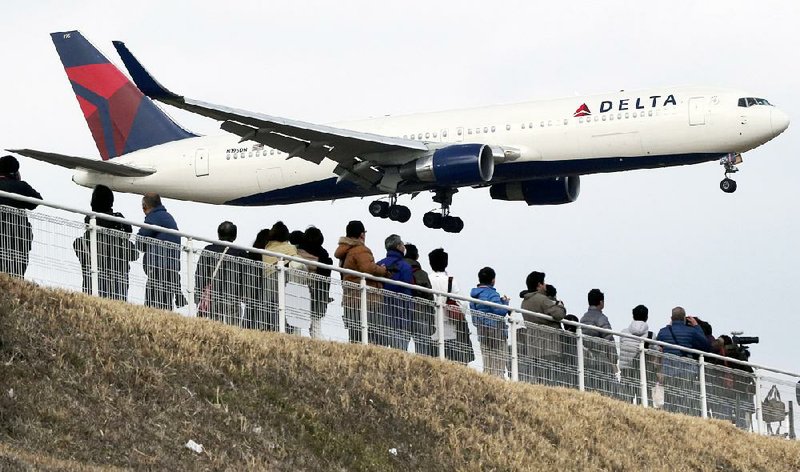Delta Air Lines Inc. said it plans to cut seating capacity later this year on international routes as the strong dollar and declining oil prices hurt overseas demand.
The pullback includes reductions of as much as 20 percent to Japan, Africa, India and the Middle East; 15 percent to Brazil; and a halt in Moscow flights, Delta said Wednesday as it posted a first-quarter profit that beat analysts' estimates. Delta stock jumped the most in almost three months.
"This is music to the ears of many investors who believe Delta should not overgrow capacity," Helane Becker, a Cowen & Co. analyst, said in a note. "The international markets have been a drag on results recently."
Delta, the world's third-biggest carrier, gets about 30 percent of its revenue from international sales. The strength of the U.S. currency, which neared a 12-year high against the euro earlier this week, is hurting demand from some foreign countries and weighing on a benchmark revenue gauge.
The scheduled reductions, to take effect in the fourth quarter, are targeted at markets most affected by the dollar and in regions where travel has been pinched by the rout in global crude prices, Delta said. The cuts amount to 3 percent of Delta's international capacity.
"We are facing over $600 million in international revenue headwinds this year from the strengthening U.S. dollar," Chief Financial Officer Paul Jacobson said in a note to employees.
Delta shares rose $1.12, or 2.6 percent, to close Wednesday at $44.20 in New York.
The stock fell 12 percent this year through Tuesday, part of a retreat for U.S. airlines that included their worst first-quarter performance since 2011.
Delta, the first of the major U.S. carriers to report earnings, gave its initial forecast for second-quarter operating profit margin at 16 percent to 18 percent. That was in line with some analysts' estimates.
"While the strong dollar is creating headwinds with international revenues, it also contributes to the lower fuel prices which will offset those headwinds with over $2 billion in fuel savings this year," Delta President Ed Bastian said in the statement.
First-quarter profit excluding one-time items rose to $372 million, or 45 cents a share, the company said. That's a record for the first quarter since Delta's 2008 merger with Northwest Airlines and beat the average analyst estimate of 44 cents.
Revenue from each seat flown a mile, a benchmark in the airline industry, decreased 1.7 percent in the first quarter, as total capacity increased 5 percent, Delta said. For the three months ending in June, Delta projects a decline of 2 percent to 4 percent.
"The substantial benefit from lower fuel prices will again more than offset the unit-revenue decline," Bastian said.
Earlier this month Deutsche Bank AG analyst Michael Linenberg downgraded Delta, United Continental Holdings Inc. and American Airlines Group Inc., saying the dollar, an increase in available seats by foreign carriers and slowing global economic growth will weigh on results.
Still, analysts are projecting a record $2.9 billion in first-quarter adjusted profit for the six biggest U.S. airlines, according to data compiled by Bloomberg, buoyed by low jet fuel prices.
Delta's seating-capacity cuts follow expansion in Brazil in recent years, largely to provide connecting passengers to partner Gol Linhas Aereas Inteligentes SA. In Asia, Delta operates a hub at Tokyo's Narita International Airport, where it has been cutting back while serving more Asian destinations from Seattle and other U.S. airports.
Airlines can reduce the number of available seats by flying routes less frequently, dropping service -- as with Delta's fourth-quarter halt to Moscow -- or by switching to smaller planes from larger aircraft.
Information for this article was contributed by Mary Schlangenstein of Bloomberg News.
Business on 04/16/2015
